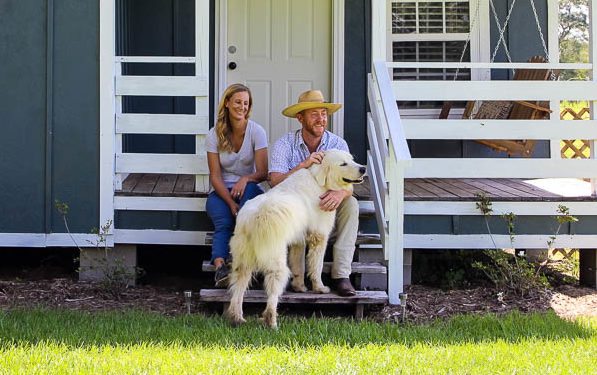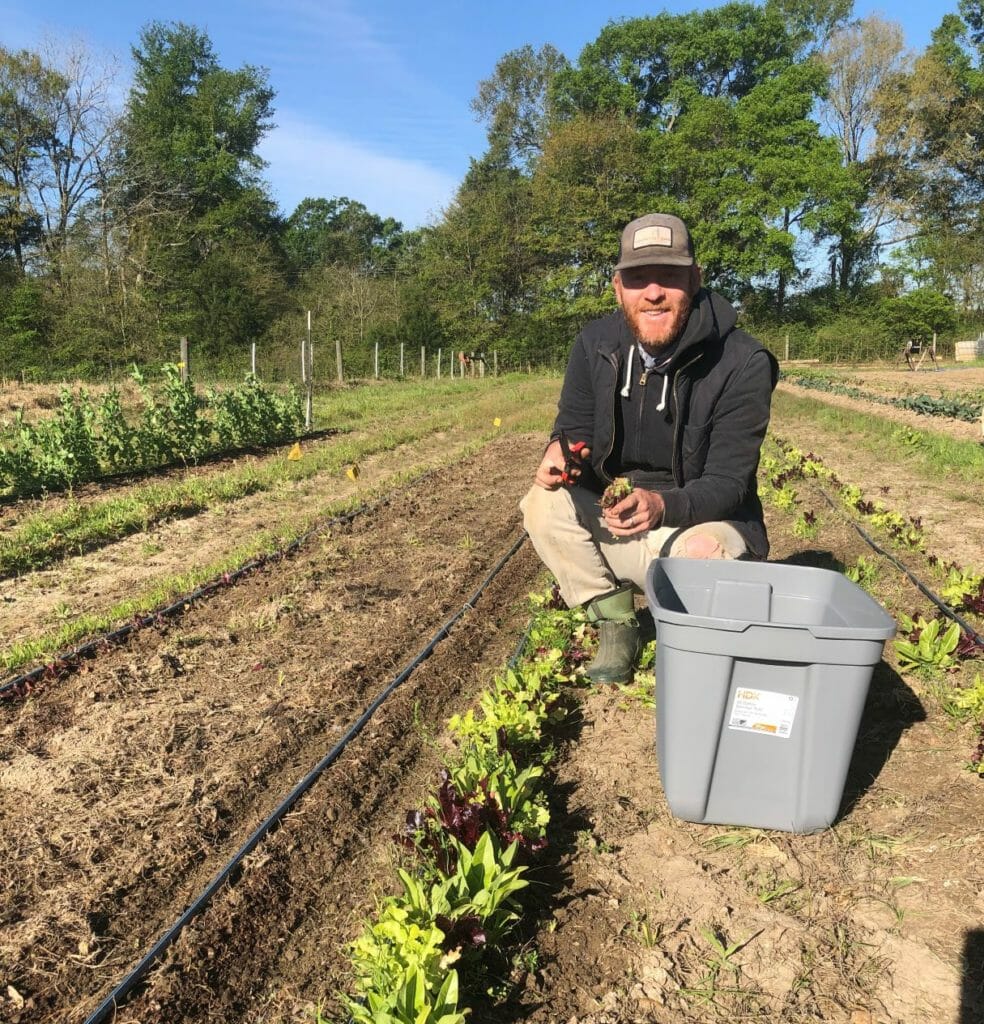Year One: ‘Without Optimism, You Can’t be a Farmer’
The fourth installment in a series about the challenges faced by new farmers.
Year One: ‘Without Optimism, You Can’t be a Farmer’
The fourth installment in a series about the challenges faced by new farmers.

Meredith and Steven Elliott launched their farm in Walnut Hill, Florida.courtesy of Maeday Farm
Meredith Elliott and her husband, Steven, spent the first six months on their farm in a state of “optimistic terror.”
The couple used their savings to buy their farm—Maeday Farm—in northwest Florida and drained every bank account they had to buy tools, seed and other equipment. During their first few months, their bills piled up without having brought in a single dollar of revenue and neither of them had experience as entrepreneurs. They were taking a huge risk starting a farm, but they remained optimistic for its potential.
“Without optimism, you can’t be a farmer. Something along the way will crush your spirit,” says Meredith.
The Elliotts met in Austin, Texas, working in the corporate office of a real estate investment trust. They worked in sales and marketing until they realized that the corporate treadmill wasn’t for them. They sought something more fulfilling and were passionate about finding ways to fix what they saw as a broken food system.
Steven quit his job first and worked on three different farms in Central Texas to learn about farming. After doing a ton of research, they bought 47 acres about an hour away from Pensacola, Florida, and not too far from Mobile, Alabama. There weren’t any local organic farmers in the area, and there was also a small but growing farm-to-table scene at restaurants in these two cities.
Their farm needed a lot of work at the beginning, as it had been abandoned for at least a year before they took ownership, and the land was previously used to grow hay. They also needed to build a greenhouse and neither had construction experience.
In their first six months in Florida, the Elliotts had to adjust from a life with steady paychecks, but lacking passion, to life on the farm. They couldn’t afford to pay someone to do things for them that they couldn’t do themselves and were forced to learn new skills by necessity. In addition to being farmers, they’re now part-time mechanics, housekeepers and barbers.
They narrowly escaped Hurricane Michael, which devastated areas further west around Panama City. It wasn’t the catastrophe it could have been for the Elliotts, but the storm’s proximity served as a stark reminder of how the new farmers could lose everything overnight.
“We totally believed in our vision,” says Meredith. “We believed in the market that we selected. We believed in the farmland we selected, but there is just so much that’s out of your control. We could have been wiped out by one unfortunate weather event.”

In order to make sure they had some income that wasn’t dependent on the whims of Mother Nature, the Elliotts converted a shed on their property into a two-bedroom cottage they rented out.
While they were lucky to elude the worst of the hurricane, the effects of the pandemic in this year were inescapable. When the pandemic hit, the couple’s regular farmers market in Pensacola closed down, and Florida banned cottage rentals for six weeks, cutting off their income from the cottage. The Elliotts reached out to other farmers in the area and set up a pop-up stand to sell produce within a few weeks, and kept this market small to allow for social distancing.
The couple has also used their web and marketing background to launch an online store, and start a CSA. As new farmers, creating a list of available vegetables on their website before harvest was a challenge at first. “We didn’t want to over promise how much we could harvest, nor did we want to leave anything in the field that could have been sold. We’re still learning, but improving more each week,” says Steven.
Meredith says there hasn’t been a particular moment of relief for them yet when they’ve been able to escape the feelings of terror, but they’re still optimistic. The Elliotts have made some mistakes, but they also scored a number of small victories that have helped propel them forward.
It took a lot of sacrifice, humility and the support of friends and family to get them through their first year, but the couple is finally living the life they always dreamed of.
Follow us
This work is licensed under a Creative Commons Attribution-NoDerivatives 4.0 International License.
Want to republish a Modern Farmer story?
We are happy for Modern Farmer stories to be shared, and encourage you to republish our articles for your audience. When doing so, we ask that you follow these guidelines:
Please credit us and our writers
For the author byline, please use “Author Name, Modern Farmer.” At the top of our stories, if on the web, please include this text and link: “This story was originally published by Modern Farmer.”
Please make sure to include a link back to either our home page or the article URL.
At the bottom of the story, please include the following text:
“Modern Farmer is a nonprofit initiative dedicated to raising awareness and catalyzing action at the intersection of food, agriculture, and society. Read more at <link>Modern Farmer</link>.”
Use our widget
We’d like to be able to track our stories, so we ask that if you republish our content, you do so using our widget (located on the left hand side of the article). The HTML code has a built-in tracker that tells us the data and domain where the story was published, as well as view counts.
Check the image requirements
It’s your responsibility to confirm you're licensed to republish images in our articles. Some images, such as those from commercial providers, don't allow their images to be republished without permission or payment. Copyright terms are generally listed in the image caption and attribution. You are welcome to omit our images or substitute with your own. Charts and interactive graphics follow the same rules.
Don’t change too much. Or, ask us first.
Articles must be republished in their entirety. It’s okay to change references to time (“today” to “yesterday”) or location (“Iowa City, IA” to “here”). But please keep everything else the same.
If you feel strongly that a more material edit needs to be made, get in touch with us at [email protected]. We’re happy to discuss it with the original author, but we must have prior approval for changes before publication.
Special cases
Extracts. You may run the first few lines or paragraphs of the article and then say: “Read the full article at Modern Farmer” with a link back to the original article.
Quotes. You may quote authors provided you include a link back to the article URL.
Translations. These require writer approval. To inquire about translation of a Modern Farmer article, contact us at [email protected]
Signed consent / copyright release forms. These are not required, provided you are following these guidelines.
Print. Articles can be republished in print under these same rules, with the exception that you do not need to include the links.
Tag us
When sharing the story on social media, please tag us using the following: - Twitter (@ModFarm) - Facebook (@ModernFarmerMedia) - Instagram (@modfarm)
Use our content respectfully
Modern Farmer is a nonprofit and as such we share our content for free and in good faith in order to reach new audiences. Respectfully,
No selling ads against our stories. It’s okay to put our stories on pages with ads.
Don’t republish our material wholesale, or automatically; you need to select stories to be republished individually.
You have no rights to sell, license, syndicate, or otherwise represent yourself as the authorized owner of our material to any third parties. This means that you cannot actively publish or submit our work for syndication to third party platforms or apps like Apple News or Google News. We understand that publishers cannot fully control when certain third parties automatically summarize or crawl content from publishers’ own sites.
Keep in touch
We want to hear from you if you love Modern Farmer content, have a collaboration idea, or anything else to share. As a nonprofit outlet, we work in service of our community and are always open to comments, feedback, and ideas. Contact us at [email protected].by Alex Robinson, Modern Farmer
July 18, 2020
Modern Farmer Weekly
Solutions Hub
Innovations, ideas and inspiration. Actionable solutions for a resilient food system.
ExploreExplore other topics
Share With Us
We want to hear from Modern Farmer readers who have thoughtful commentary, actionable solutions, or helpful ideas to share.
SubmitNecessary cookies are absolutely essential for the website to function properly. This category only includes cookies that ensures basic functionalities and security features of the website. These cookies do not store any personal information.
Any cookies that may not be particularly necessary for the website to function and are used specifically to collect user personal data via analytics, ads, other embedded contents are termed as non-necessary cookies.
Good luck to this couple & they are exactly what is needed to get things back to real food instead if the limited offerings from the giants ! Each area should be prepared to help small business as they are the backbone of society ! For the rest of us who have slaved away in a small veggie patch in prior years, we do know how hard this work is….so hopefully you stay healthy & enjoy your new lives !
That’s really great you guys growing organic out in Walnut Hill, I have friends that live there and often wished to own a small farm myself out there. Wish you the best of luck.